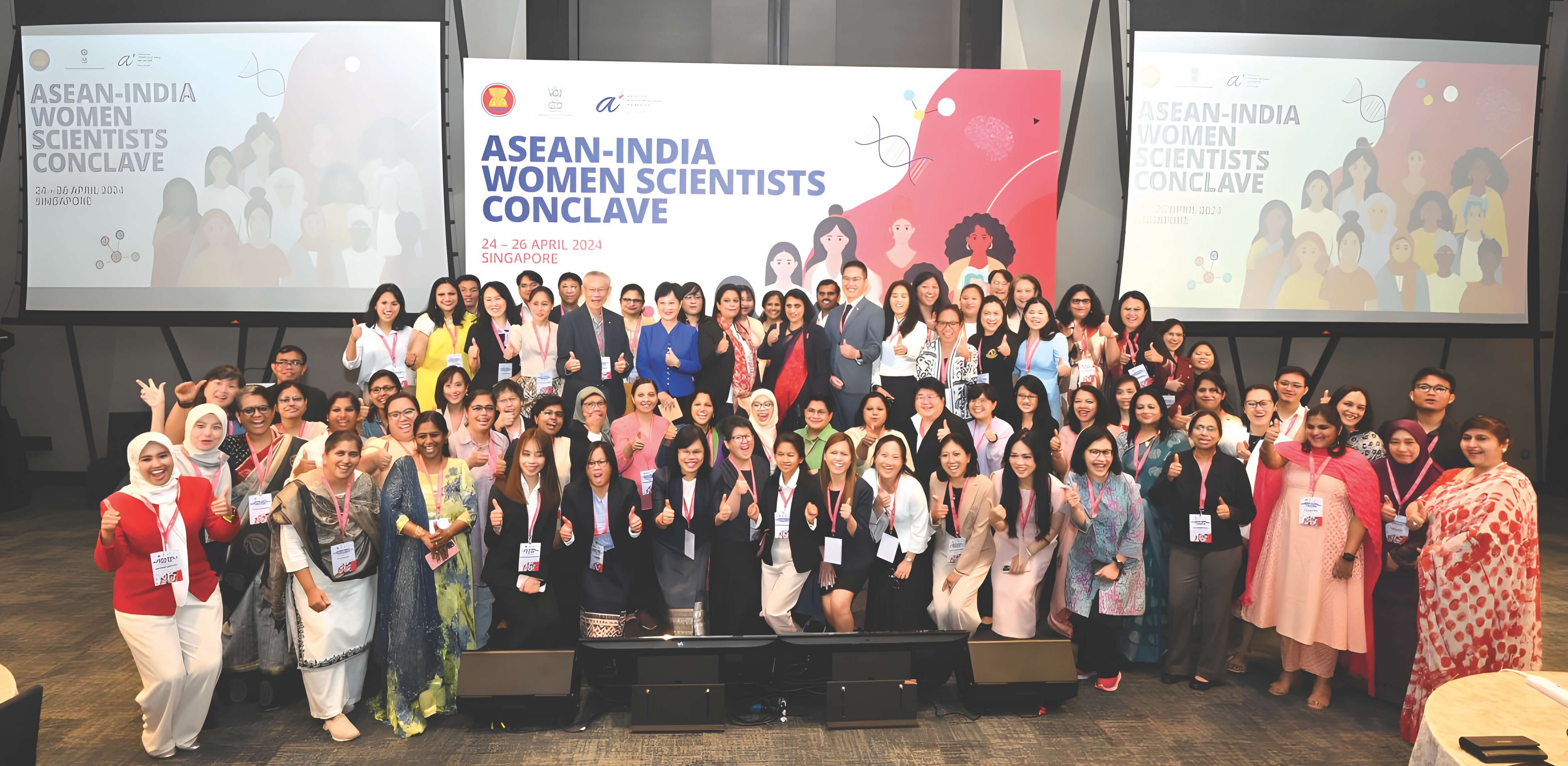




Gender equality is necessary for a peaceful, prosperous, and sustainable world. Women’s entrepreneurship plays a crucial role in advancing global economic empowerment and closely interconnects with gender equality. Empowering women has multiplier effects on poverty eradication and economic growth.
Over the past two decades, the ASEAN Member States have made remarkable progress towards reducing poverty and gender inequality in vital areas, such as increasing women’s per capita income, access to education, participation in decent employment, and decision-making roles (ASEAN and UN Women, 2021).
Women entrepreneurship is key to promoting this inclusive economy across the region. Over the past decade, the number of women entrepreneurs has increased steadily. According to the Global Entrepreneurship Monitor 2018, more than 60 million women across ASEAN operate micro, small and medium enterprises (MSMEs).
The COVID-19 pandemic has disproportionately affected women entrepreneurs for several reasons. Lockdowns and working from home have placed an extra burden on women who are also most likely to be responsible for child and elderly care. Women comprise the majority of temporary workers in the informal sector who are less protected by social safety nets. They face more difficulty in accessing credit, which is fundamental for the survival of their firms in times of economic downturn, compared to men counterparts (Marsan and Ruddy, 2020).
The G20 countries’ Global Partnership for Financial Inclusion and the Indonesia G20 Presidency organised the G20 Workshop on Digital and Innovative Financial Products and Services for MSMEs Beyond Credit, a virtual workshop on 2 March 2022. The showcase of innovative non-credit financial products and services helps MSMEs recover from COVID-19 and advance digital financial inclusion. Primarily targeting women and youth start-ups, the event highlighted that monetary support is not the sole determinant of success. Technological-based knowledge and skills, including digital payments, insurance, leasing, guarantees, risk management, and other non-financial aspects, are also critical and offer considerable benefits to women-led businesses’ growth and sustainability.
The world economy has plunged into recession since the COVID-19 pandemic broke out. Global growth contracted by -4.9 per cent in 2020, with almost all countries in ASEAN experiencing negative growth, except Viet Nam (WEO, 2020). However, the accelerated digitalisation of various sectors across the globe is considered a silver lining despite the massive disruption caused by the pandemic.
Still, the increased adoption of Artificial Intelligence technology and digital technology threatens many women workers whose skill sets do not match the current requirements of their job or future job opportunities. The shift to technology during the COVID-19 pandemic has certainly forced many women’s manufacturing and services jobs out of the market. A recent Cisco and Oxford Economics study titled Technology and the Future of ASEAN Jobs estimated that 6.6 million workers in ASEAN would be required to adapt their skills and forge new careers to remain productively employed over the next decade. Women entrepreneurs, in particular, need to acquire new or upgrade their skill sets to meet the requirements of fast-changing technologies and take advantage of emerging market opportunities.
Over the past few decades, the Southeast Asian region has sustained its economic growth trajectory. The success has translated into financial gains for women and increased in female labour market inclusion. In 2015, female labour force participation in Southeast Asian countries was close to 67 per cent, exceeding the OECD average female labour force by about f ive percentage points (OECD and ASEAN, 2017). ASEAN’s women have a bright future in employment and entrepreneurship.
New MSMEs jobs are being created along the lines of digital technologies following the Fourth Industrial Revolution. The ASEAN Member States have assessed the market requirements and relevant women’s skill sets to enhance their entrepreneurial capacity. They acknowledged that the pandemic obstructed economic growth due to mobility restrictions and the disruption of the supply chain. However, it has opened up a wide range of opportunities for digital learning and remote work arrangements for women. The ASEAN addresses the critical barriers to women’s entrepreneurial activities post-COVID-19: women’s inability to access appropriate technological-based knowledge and society’s gender stereotyping of jobs. Providing women access to business networks and the environment is essential, but these challenges vary due to cultural norms.
On the digital economy wave, the ASEAN is amongst the fastest growing economies, creating an internet market and new jobs. The ASEAN Gender Outlook (ASEAN and UN Women, 2021) estimated that 125,000 new users join the market every day, which offers tremendous opportunities. Unfortunately, most men occupy those related jobs. Several countries in ASEAN confirm the intensification of women’s unpaid care and domestic work tasks, such as cooking, cleaning, water collection, and care of children, especially during the stay-at-home and lockdown phases of the pandemic. Women’s time used in unpaid care i s a constraint for participating in the economy when compared with that of men (ESCAP, 2021). The ASEAN market economy data also showed a wage gap, with women earning 58 per cent less than their partners. For men, the opportunity to be employed in the digital economy is about 11.5 times higher than for women. The report further noted that women in the region are more likely than men to live in poverty. And during the COVID-19 pandemic, about 30 per cent of women said their domestic work intensity had increased, compared to only 16 per cent of men.
Gender inequality, therefore, remains to be addressed by the ASEAN Member States. It underpins the differences between women and men in access to entrepreneurial opportunity, resources, decision-making, and social connection for businesses. It covers the cultural norms that prohibit women from meaningful participation in new opportunities, businesses, and job environments.
Women’s barriers to entrepreneurial success include the lack of training opportunities, spatial mobility, and lack of family and institutional support. To ensure gender inclusion, women’s potential for entrepreneurship, especially in the digital technologybased knowledge and skillset, needs to be unlocked by addressing the underlying causes of these issues.
Lack of technological skill sets
Women’s traditional occupational training leaned heavily towards hospitality services, such as children and elderly care, cooking, sewing, and hairdressing, which do not match the market demand. This narrow female stereotype should be addressed by shifting the focus of training to enhancing women’s technological knowledge and entrepreneurial management skills.
Facilitating flexible working arrangements for mothers and fathers in the employment setting could also boost the mother’s participation rate in training activities. More free time could encourage women to attend more extended courses or gain technological knowledge, such as setting up an online or digitalising businesses to succeed in their entrepreneurial activities (UN Women, 2021).
Digital and gender divide
The waves of digitalisation have brought both positive and negative effects on women’s entrepreneurship. Those who ventured into and kept abreast of technological developments are more prepared and are gaining the most from the new market landscape shaped by technologies. However, globally, women entrepreneurs are often poorly represented in technology start-ups, especially those in poor rural areas (Klingen, et al., 2021). Digital skills and access to digital infrastructure, digital public platforms, and digital financial services remain critical barriers for women due to cultural norms, lack of appropriate skill training, and public investment in this sector. Women’s access to a shared digital platform often requires registration costs and, in some instances, even the endorsement from a male spouse. The digital financial services for receiving wages and monetary assistance from government schemes during the COVID-19 pandemic can save women’s time and enable their sense of self-control, including privacy, contributing to women’s empowerment. However, many women are marginalised from these services due to knowledge barriers and lack of access to support groups and networking to utilise these available financial online services confidently.
During the pandemic, more women-led MSMEs had to close their businesses temporarily. They have been disproportionately affected, as many are in the informal and gig economy sectors, which were hit hard by lockdowns. Adapting to the new normal from the COVID-19 pandemic has forced many businesses to switch to online activities and increase their digital presence using digital platforms to connect to customers for shortterm services. Examples include ride-hailing and food delivery application use. These online activities have exposed the digital divide, where most women-led businesses cannot adapt to the challenges and suffer more significant losses than men- led MSMEs. Women sought out more government support for mentoring and business literacy and assistance with teleworking arrangements. Furthermore, the pandemic has exposed more women users to cybersecurity and online safety risks in an environment where cyber hygiene practices are generally poor (Curtis, et al., 2022).
Limited access to formal financing and business networks
Financial inaccessibility has been a persistent hindrance despite the growth and contribution of womenowned businesses in both the formal and informal sectors in Southeast Asia. A study on women-led MSMEs in four Southeast Asia countries showed that 48 per cent in Cambodia, 39 per cent in the Philippines, 31 per cent in Indonesia, and 25 per cent in Viet Nam relied on informal sources of financing, i.e., from friends and family instead of bank loans. Women’s access to formal banking and financing in some cultures and religions needs the consent of male family members. Further, women’s businesses are informal and lack documentation of their business operations; they lack collateral such as land, building, security papers, or deposits. In many cases, women often lack ownership rights due to a religious or cultural tradition of registering assets to men. Women often lack a network from which they can gather information regarding financing options, access a role model or mentor, or connect with other women who can provide advice (Women’s World Banking, 2015).
Moving forward
Given the barriers mentioned above, ASEAN’s policy has paid attention to the implications for improving women’s meaningful participation in various entrepreneurial activities. Governments and partner agencies have taken concrete steps to close the gender gaps through digital technology education and address the critical root causes of gender inequality. Weaknesses in digital skills within MSMEs contribute to economic vulnerabilities across the region. Digital skills development is a necessary complement to technology adoption and a key driver of resilience for economies to weather disruptive changes and external shocks. ASEAN Member States need to prioritise the digital skills growth of women to unlock their productivity Information technology policy needs to accompany digital skills and gender awareness investments.
Disruptive technology and digitalisation have already affected women’s day-today business operations and lifestyles. The COVID-19 pandemic seems to have accelerated digitalisation, and many women workforces in ASEAN have already realised their skill sets do not match the requirements of future job opportunities. The ASEAN Member States’ policies will need to pay close attention to upgrading or reskilling the labour force, emphasising women’s skills as their barriers are more complex than their men counterparts.
It is essential to build digital skills and technology early and stir girls’ interest and confidence in these fields. Complementing technical skills training with soft skills through practising internships, apprenticeships, and job placement programmes will help girls and women unlock their potential. These skills will prepare them to fill labour market demands and take on high-risk entrepreneurial ventures that may lead to greater economic gains. During this ongoing pandemic, it is critical for girls and women to continue learning without disruption by giving them access to digital technologies, such as mobile phones, computers, and the internet. It is central to women’s empowerment and inclusive economic recovery.
ASEAN Member States need to pay close attention to all forms of discrimination and misperception of gender equality that continue to exist in complex societies. At work, maternity and paternity leaves are necessary to divide the burden between men and women in childcare. Shared childcare duties will give women more time to engage in their professional careers and not be forced to drop them entirely. Furthermore, policy intervention to provide flexible time and free women from the burden of household responsibilities will help them advance their professional development and take on crucial entrepreneurship activities. Finally, the Member States need to continue to work on eliminating all forms of violence against women through modernising the legal framework to protect women from domestic violence and harassment at the workplace.
Led by the Ministry of Women’s Affairs of Cambodia as the Focal Point for ASEAN Committee on Women (ACW) Cambodia, the Declaration on Unlocking Women Entrepreneurship in ASEAN is one of the critical milestones and deliverables related to the promotion of gender equality and empowerment of women and girls. The declaration is expected to be adopted by the ASEAN Leaders at the 40th and 41st ASEAN Summits in November 2022. Under Cambodia, as Chair of ASEAN 2022, the declaration aims to serve as a manifestation of the high-level regional commitment of the ASEAN Leaders to support and foster women’s economic empowerment and women entrepreneurship as a critical path toward recovery from the COVID-19 pandemic, long-term resilience, and sustainable development for all.








